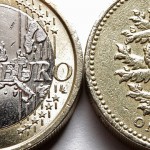European shares plunged sharply on Monday after the Greek vote in regard to the bailout conditions proposed by the countrys creditors in late June.
On Sunday it became clear that 61% of the Greek voters said a sonorous “No” to austerity measures, which the European Central Bank, the International Monetary Fund and the European Commission had required on June 25th. The vote makes the future of the country in the common currency zone uncertain and also heightens the risk of a full-blown crisis in the Euro region. Such a result was, to a certain extent, expected by leaders of business entities in the UK, surveyed by the Institute of Directors (IoD). On July 3rd the IoD revealed that 26% of respondents saw the possibility of Greece withdrawing from the Euro zone as “very likely” in 12 months time. An additional 47% supposed that a withdrawal in the upcoming 12 months was “somewhat likely”.
The referendum vote triggered demand for safe haven assets. The yield on Germany’s 10-year government bonds went down six basis points (0.06 percentage point) to reach 0.73% earlier today, which has been the largest drop since June 29th. The Greek bonds have slumped 23% in 2015, according to Bloomberg World Bond Index data. On the other hand, Euro zone bonds have dropped 1.5%.
“The strength of the ‘no’ vote in the Greek referendum comes as a shock to the market, and all safe-haven trades should benefit,” Peter Chatwell, a strategist at Mizuho International Plc in London, wrote in a note to clients yesterday, as reported by Bloomberg.
Following the vote in the referendum, Greek Minister of Finance, Yanis Varoufakis, announced his leave from the Ministry.
“Soon after the announcement of the referendum results, I was made aware of a certain preference by some European participants, and assorted ‘partners’ for my ‘absence’ from its meetings: an idea that the prime minister judged to be potentially helpful to him in reaching an agreement”, according to Varoufakis’s personal blog. “For this reason I am leaving the Ministry of Finance today.”
Greece became the first developed country to skip a payment to the IMF, as it did not observe its USD 1.7 billion obligation during the week ended on July 5th. According to the IMF, the nation is in need of USD 40 billion in the form of international aid as well as less stringent outstanding debt terms in order to manage its financial position.
The German benchmark, DAX 30 (GDAXI) plunged a third day in a row, down more than 1.2% to reach a daily low at 10,819.50 at 7:02 GMT. It has been the lowest level since June 18th, when the index slumped to a low of 10,806.15.
Frances CAC 40 (FCHI) went down over 1.4% to record a daily low at 4,699.50 at 7:02 GMT. It has been the lowest level since February 17th, when the benchmark slid to a low of 4,683.19.
Italys FTSE MIB 40 (FTMIB) lost more than 2.7% for the day to reach a daily low at 21,846.00 at 7:02 GMT. It has been the lowest index level since February 24th, when the gauge registered a low of 21,775.59.
The European STOXX 600 slipped over 1.4% on the day to reach a daily low at 377.70 at 7:02 GMT. It has been the lowest level since February 19th, when the index fell to a low of 377.35.





